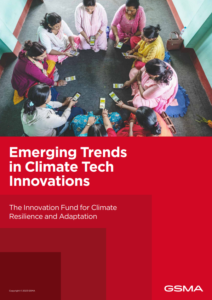30 June 2023. Driving climate impact through frontier technologies in the global south -
This interactive session marks the launch of the GSMA ClimateTech programme’s new report
GSMA (2023) Emerging Trends in Climate Tech Innovations # 18 p.
In February 2021, the ClimateTech programme published The Role of Digital and Mobile-Enabled Solutions in Addressing Climate Change. This report discussed seven areas in which digital technologies can be used to combat climate change: clean energy and energy efficiency: transport, mobility and logistics; natural resource management and forestry; agriculture; managing water solutions; waste management and circular economy solutions; and disaster preparedness and response. It also explores the use of mobile and digital solutions for climate finance, and the application of frontier technologies.
On 22 November 2022 at COP27, the GSMA, together with FCDO and Sida, announced the 12 organisations that had been awarded a grant under the GSMA Innovation Fund for Climate Resilience and Adaptation. The GSMA Innovation Fund for Climate Resilience and Adaptation received a total of 524 applications. March 2023 GSMA launched a second round: The Innovation Fund forClimate Resilience and Adaptation 2.0.
- Agricultural solutions dominated the pool of applications, with 46% of projects focusing on this sector. This highlights a growing awareness of the linkages and dependencies between agriculture and climate change.
- Mobile apps are the most commonly used technology feature.
- More than half of the applicants had more than one business model. For example, one for direct-to-consumers and another for businesses. It would be valuable to create more evidence on successful business models to demonstrate how start-ups and larger institutions can work in partnership effectively.
12 organisations
- Aquarech (Kenya): Improving fish farmers’ productivity, enabling market access and creating an inclusive aquaculture value chain through the use of mobile technology and IoT sensors.
- BaKhabar Kissan (BKK) (Pakistan) Strengthening agricultural productivity and planning for climate-vulnerable farming communities through a network of new weather stations to provide hyperlocal weather information, as well as enabling access to agricultural expertise through digital platforms
- BENAA (Egypt) Supporting water resource management using IoT to help convert wastewater into irrigation water for small farms in rural Egypt.
- CoAmana (Nigeria) Improving agricultural productivity and helping farmers manage financial risks related to drought in Nigeria, through a digital marketplace for farmers to access markets, purchase drought-resistant seeds and access information on best practices and financial services
- Crop2Cash (Nigeria) Supporting farmers facing drought conditions in Nigeria to adapt their farming practices through climate-smart farming content and manage financial risks through their digital marketplace, connecting farmers to high-yield, drought-resistant maize seeds via USSD.
- Dayaxa Frankincense Export Company (DFEC) (Somaliland) Creating a regenerative model for positive social, ecological and economic change by working with farmers in Somaliland to harvest sustainable produce, achieve fair pricing and improve day-to-day living standards for farmer communities.seeds and access information on best practices and financial services.
- GeoKrishi (Nepal) Helping smallholder farmers in Nepal adapt to climate stressors and adopt climate-smart agricultural practices through digital learning content and advisory services.
- Hello Tractor (Nigeria) Improving planning and preparedness for farming communities facing unpredictable rainfall patterns in Nigeria, by using weather and historic tractor service demand data to model and optimise tractor service provision.
- J-Palm (Liberia) Transforming the sustainability of wild palm oil through access to ecological information for local harvesters, as well as mobile blockchain technology for improved traceability
- Komunidad (Philippines) Upgrading communities’ capacity to respond to disasters in the Philippines with a typhoon early warning system and weather analytics platform designed to help the local government plan and prepare for hazards more efficiently and accurately
- Lersha (Ethiopia) A one-stop digital service for smallholder farmers that provides advisory content on climate-smart agriculture solutions, weather information and facilitates access to agri-credit and agri-insurance.
- Simusolar (Tanzania) Supporting fishers in securing livelihoods, adapting to weather changes and sustaining fisheries management in Lake Victoria, Tanzania, through IoTenabled productivity and activity tracking equipment
The webinar of 30/06 (recording forthcoming) discussed different ways that frontier and digital technology can be used for climate impact in LMICs. It presented new insights on emerging trends in climate technology and innovations from the latest grant funding round of GSMA and the start-ups awarded with grants by the GSMA. They shared how they are creatively using digital technology such as the Internet of Things (IoT) and blockchain to help communities anticipate and adapt to climate shocks and stressors.
- Samir Hafiz – Climate Monitoring, Evaluation and Learning Manager, GSMA ClimateTech
- Luisa Odell – Innovation Advisor, UK Foreign Commonwealth and Development Office (FCDO)
- Nadja Dolata, Policy Specialist Digital for Development, Swedish International Development Cooperation Agency (Sida)
- Aya Tarek Helmy – Co-Founder, BENAA
- Mahmud Johnson, Founder, J-Palm
- Allister Ayque – Co-Founder, Komunidad
- Leila Guici – Insights and Advocacy Manager – Climate Tech, GSMA ClimateTech (moderator)
Innovative start-ups presented in this session:
- BENAA - supporting water resource management using the Internet of Things to help convert wastewater into irrigation water for small farms in rural Egypt.
- J-Palm - transforming the sustainability of wild palm oil through access to ecological information for local harvesters, as well as mobile blockchain technology for improved traceability in Liberia.
- Komunidad - upgrading local government capacity to prepare for hazards more efficiently and accurately in the Philippines with a typhoon early warning system and weather analytics platform.
Digitally Enabled Climate Finance
This flagship report by the GSMA ClimateTech programme provides emerging insights on the role of mobile and digital technology in accessing and delivering climate finance in low- and middle-income countries (LMICs).



No comments:
Post a Comment